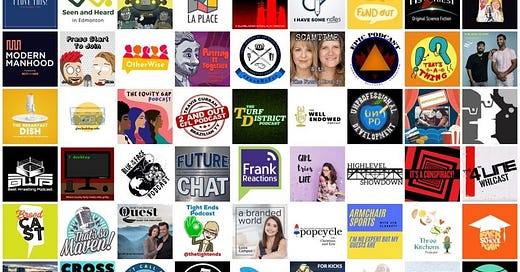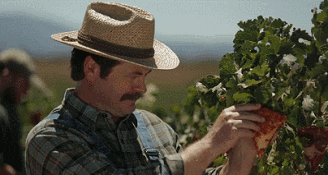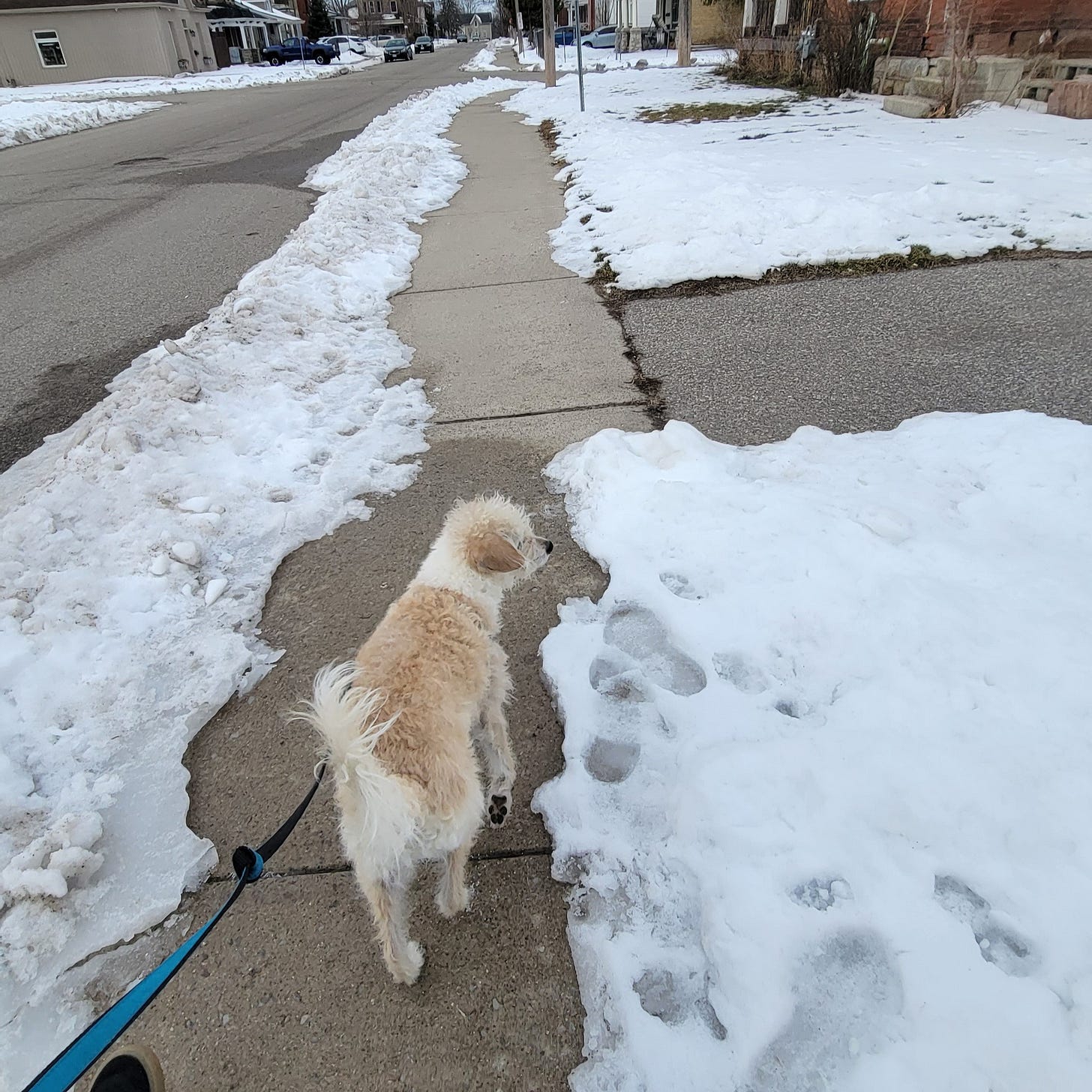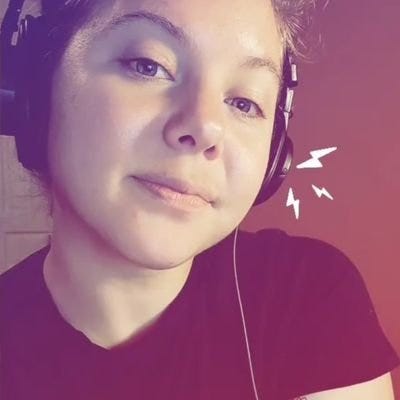A Love Letter to the Alberta Podcast Network
Vol. 16 - Goodbye APN - Candid convos with former MPs - Hot Docs is doubling down on podcasts.
Hihi!! Happy Pod the North Tuesday!
Some quick housekeeping! If you’ve been subscribed to Pod the North for a little while, you may have noticed “pledge” buttons popping up - well now those buttons say “Upgrade to paid”!
While Pod the North will always be a free resource, I’ve officially launched the option to monitarily support me if you’d like to on a monthly or yearly basis. If you have previously pledged your support, heads up that you will be billed going forward!
If you love what I’m doing here, you can also support me on a one-off basis and buy me a coffee! Any way you chose to support me, even if it’s just by being a regular reader, is so appreciated. Pod the North is a total labour of love and personal side project that stemmed from fury and passion, so I’m always genuinely excited to see new subscribers and to get feedback. Incase I haven’t told you enough, thank you for all of your ongoing support!
Okay enough of that. 148 days until I explore Nova Scotia!
In this issue:
That’s it for the Alberta Podcast Network.
Sabreena Delhon never could have guessed how deeply personal her conversations with former politicians would get.
Canadian Indie: The Narcissist Apocalypse Podcast
True North: Mawmaw Sachweezin - Mom's Kitchen Metis Cooking
Just 3 Canadian podcasts were in the top 10 podcasts in Canada for February 2023.
ICYMI: Rick Harp just put out an incredible episode of Media Indigena about the correlation between water security and First Nations suicide. There are still 32 long-term drinking water advisories in effect in 28 First Nations communities across Canada.
This week, Calgary-based freelance podcast producer and consultant, Jess Schmidt, is taking over the top of this issue to mourn the loss of the Alberta Podcast Network.
Here’s Jess..
I’m a long-time reader of Pod the North and a huge fan of Kattie’s ever since we met at Hot Docs Podcast Festival in Toronto many, many moons ago.
Since then, I’ve completed a degree, officially started a my career as a freelance podcaster, became a dog mom, and fled back to my hometown of Calgary, Alberta on the heels of the global pandemic.
It was not an easy transition, and not just because of COVID. I love Alberta and the arts and culture scene of this province, but I wouldn’t say (from my experience, anyways) that podcasting thrives here the same way it does in other parts of Canada.
The prairies are famous for being hardscrabble, and unfortunately that extends to creative industries. The fruits of whatever can survive here are very high calibre, but there’s a LOT of labour involved. With every successful harvest, you’re waiting for the other shoe to drop – scanning the horizon for the next inevitable challenge. (Okay, the farming analogies end here as I am in fact a city girl through and through.)
That’s why I was deeply saddened by the Alberta Podcast Network’s announcement on March 31st that they were calling it quits.
Since its start in 2017, the APN grew to include 80+ member and affiliate shows. They were responsible for distributing over $125,000 in funding by delivering ads from local advertisers at an affordable rate. For 5 years, they have indeed delivered on their tagline of being "locally grown and community supported".
The Alberta Podcast Network was NOT your average podcast network. In their own words, their main mission was to “build audiences for Alberta-made podcasts and connect those listeners to Alberta-based businesses, organisations, and community partners” – an important lesson for all of Canadian podcasting, not just Alberta.
While Toronto and Vancouver serve as Canada’s major podcast hubs, the rest of us outside of those cities still make up a sizable slice of the industry. In a place as big as Canada, not to mention the vastness of the Internet, it can be incredibly hard to bring a community together. You know that already, because any reader of Pod the North is here because Kattie brings us that national connection that is sorely lacking across most of the Canadian podcast industry. Local support is exactly what the Canadian indie podcast community needs more of, not less.
The Alberta Podcast Network succeeded at the mission of bringing Alberta's podcast industry together, and they not only helped to get the word out about some amazing shows – like; I Love This, You Should Too!, Glass Bookshop Radio, Crow Reads, Makeshift Stories, and Crosspoli-Nation (among others, these are just some of my faves) – but they also created a way to allow indie shows to access the kind of support that often sits just behind the branded content barrier, especially from a financial standpoint.
While I don’t know the specific details of why APN is shutting their doors, from seeing other endeavours in this province (and this country, if we’re being honest) get left out in the cold I can well imagine why they decided to call it quits.
Thank you to the APN team for all your hard work – Karen Unland, Katrina Ingram, Fawnda Mithrush, Breanne Byrne, and whoever else was working tirelessly behind the scenes – and to all the hard-won Alberta podcasts and partners who chose to broadcast and advertise under the Alberta Podcast Network banner, and still continue to contribute to the community.
Alberta Podcast Network, I can say with absolute certainty that you will be missed. <3
Thoughts from the ecosystem:
Sabreena Delhon never could have guessed how deeply personal her conversations with former politicians would get.
Did you know that there’s an entire entity who does exit interviews with former Members of Parliament?
I certainly did not!
If you’re dying to know what is being said in those exit interviews like I was, it’s time add Humans of the House to your queue, a fantastic new podcast from The Samara Centre for Democracy and Media Girlfriends.
I have zero shame in outing myself as the family member who will talk politics at Christmas dinner. It stuns me when I talk to people who aren’t interested in politics because I am so deeply fascinated by the decision-making powers in our country, especially when it feels like there is so much on the line.
Humans of the House is already chock full of candid conversations from former MPs talking about their time in government, what the job is really like, their regrets, and what they think needs to change in the House of Commons.
I’m a big fan podcasts that can be used as resources for good, so I talked to the Samara Centre’s Executive Director, Sabreena Delhon (who also hosts the podcast) about the show and how the podcast could impact our democracy as we know it.
This interview has been condensed and edited for brevity.
KL: Let’s start with the Cliff's Notes of what Humans of the House is and what listeners can expect from the season ahead.
SD: So the Samara Centre for Democracy is a nonpartisan registered charity and we've been around since 2008. For over a decade we've been conducting exit interviews with former Members of Parliament – this is a signature initiative that we do.
Humans of the House is a show where you're going to hear politicians without talking points. It's a show where you're going to hear not from observers of Canadian politics, but from those who have lived it talking about what needs to not just improve with our democracy, but what's really good and can be even better.
This [season] is based on our interviews with a dozen former Members of Parliament – they left the House of Commons between 2015 and 2021 – being really open about the importance of public service, about the importance of our democracy, and also the importance of the human side of politics.
KL: In what capacity are these exit interviews actually being showcased on the podcast?
SD: It gets very personal. The personal is political. For the former MPs we talked to, we asked them what got them on the path to politics in the first place, becoming [an MP], to those first days on the job, to the nitty gritty of the job, to ultimately how it feels when the line between personal and professional is very blurred.
When you're a politician, you're there because you're representing your constituents, you're serving your community. You have a leader and a party that you also need to be accountable for, and then you have your own motivations that brought you to the position too.
This is a role where there's a very grueling schedule. There's a ton of travel. You have to be visible and “on” all the time. There’s a high likelihood of receiving threats, harassment and intimidation, especially online. A lot of mental health challenges as well. And you're really, in a lot of ways, disconnected from things that would ground you and make you able to take care of yourself. So if that's the context in which you're performing your job, your reflections about that are going to be deeply personal.
[Listeners are] gonna get some political intrigue and some back stories on things that you might have seen in the headlines, but you're also just going to hear 12 very different people reflecting on what it took for them to perform this job.
Regardless of what your starting point is in terms of political knowledge, these are human stories that are helping you better understand what is going on with our democracy and Canadian politics
So much of the political conversation today can be very angry. It's become normalized for us to see politicians dehumanized. So we wanted to find a different way for us to explore politics in Canada in an informed and substantive way, but in a way that isn't intimidating.
KL: I think for a lot of people politicians can feel like they're only in the job for personal gains. I'm curious about how hard you are digging into the political and personal affairs when you're talking to these former MPs.
SD: We do challenge them to be very forthright and we did very thorough briefings to prepare for each of these interviews. We had an understanding of what committees each individual served on and what were their positions on certain issues and did they face any scrutiny under the media? Did they make decisions that were unpopular in their parties?
[Listeners] will find them being quite responsive and candid to those questions because when [MPs are] not in the political arena, when you're not in that role anymore, you can actually speak freely about it.
KL: You said that MPs are coming on the show without talking points. I’m sure that when MPs aren’t in government anymore that that’s a lot easier of an ask. But still, anybody who's coming from a government background likely has go-to language that they use. How did you keep them “off script”?
SD: We put a lot of energy into how we invited the participants into this project. We made sure that they were fully briefed about how we wanted it to go, why we wanted it to go this way.
The Samara Center for Democracy was fortunate to work with Media Girlfriends as our producers on the show, so we're working with expert storytellers and we have expert researchers as well, combining forces.
It wasn't our intention to take anybody by surprise or shock them, but we made it clear that our motivations were to have a forthright and open conversation to the extent that they were willing.
We booked a lot of time and we had a lot of time to set up. We would just kind of chitchat and build some rapport before we launched into it. It wasn't a clinical exercise but it still had substance and integrity in terms of the questions we would ask.
For instance, in our conversation with Lisa Raitt, she talks about some media scrutiny that she received and how she could compartmentalize critique of her performance of the role [and] critique of her as a human being. She says in the conversation, “I've never talked about it this way before”.
I think that because Samara Centre for Democracy has conducted over 150 exit interviews to date, we occupy a position of trust with former MPs and we don't take that for granted.
KL: How do you compartmentalize your own political beliefs when you're interviewing these people?
SD: That's such a great question. I'm still a human. For me, it's from the research perspective – that these are respondents in our study. These are guests on our show. These are interviewees that are part of a broader research project.
KL: So where does Humans of the House sit in terms of the Samara Centre's other work?
SD: So with the MP exit interview study, analysis from those interviews have gone into a range of reports and a bestselling book called Tragedy in the Commons that came out in 2014.
Now this podcast is another medium that we can use to tell these important stories, and share the very concrete insights and recommendations that former MPs have for how to improve. We are able to share these interviews with other researchers to inform their efforts as well.
We're also proud of the fact that our resources have helped to inform aspiring MPs and other politicians too. It's a key resource for getting your head around what this job [is] really like. We hear a lot about workplace conditions and effect on recruitment and potentially retention as well, and it furthers other research efforts aimed at understanding our democracy.
Another thing is that we've worked with the Social Studies Educators Network of Canada to produce learning resources from each episode in the show. So the podcast will be drawn on in high school classrooms across the country.
Democracy is for everyone and so is this show. We've worked really hard to present it in a way that feels within reach for a lot of different people.
KL: Is there anything that surprised you about making the podcast?
SD: I had a sense that there would be openness in some ways but I never could have guessed how deeply personal the conversations were gonna get.
It takes a long time to put a show like this together, and it takes a really, really incredible team. We needed to take the time to really absorb what we were receiving and then handle it with the due care and thoughtfulness that was warranted. And this is a pretty huge undertaking.
I hope people appreciate the level of work and care we put into it.
What Sabreena is loving listening to these days:
P.S. The super talented Michal Stein also wrote a review about Humans of the House over on the Vocal Friday’s newsletter last week, and I love everything she writes. Get all the insight from her first listen here.
EDIT: The first version of this issue mentioned that there was only one episode out, when there were actually three at the time of this newsletter release. Also, former MP’s on the show left the House of Commons between 2015-2021, not 2020.
Check out this Canadian Indie: The Narcissist Apocalypse Podcast
A raw and unfiltered podcast with survivors of toxic relationships, narcissistic abuse, and domestic violence.
Part true crime. Part education. Part self-improvement. Part support group. From 'Why do people stay?' to 'Why do manipulation tactics work?' You'll get angry. You'll learn. You'll laugh. You'll cry. You'll get inspired. Find out what these guests did to survive, and make no mistake, they are the lucky ones... they lived.
True North Podcast Feature: Mawmaw Sachweezin - Mom's Kitchen Metis Cooking
Alex and Bea cook confidently while laughing, singing and reminiscing.
Brother and Sister, Alex and Beatrice Pelletier, were raised in their Mother’s Métis community of Ste. Madeline in Manitoba. They recount their adventures, traditions and memories as they cook up traditional indigenous foods.
Included with each episode is a recipe card in Mechif (Michif) and English for those of you who want a taste of the past!
What else is going on in Canada’s podcast ecosystem:
According to Triton Rankers, only 3 Canadian podcasts were in the top 10 podcasts in Canada for February 2023, all of which are news-based shows from CBC.
Hot Docs Podcast Festival has doubled down on podcasting, with a Podcast Showcase included in their upcoming documentary festival from April 27-May 7. The official Hot Docs Podcast Festival is planned for October 18-22 (just in time for my birthday!). Catch the showcase line up here!
Is it possible to be a podcast critic for both for the industry, AND for the listener? Samantha Hodder unpacked this in a really fascninating recent issue of
after a reader called her "salty" last week. Read it.A bunch of amazing Canadian women in podcasting joined me in sharing their insights about the podcast space over on Podcast Marketing Magiclast week for International Women’s History Month. Read it here.
Do you have a friend who has never listened to a podcast? TINK Media has started a global grassroots campaign where podcast lovers help non-listeners turn into listeners. Get more info here and JOIN THE CAUSE!
For your pod:
What you need to know about YouTube: Pacific Content’s Audience Development Lead, Russ More, has got you covered and is unpacking all of the latest updates from YouTube on the Pacific Content blog. Read it here.
Get your podcast featured on GoodPods! Right now GoodPods will feature “as many podcasts as they can” that have added a "Listen on Goodpods" badge to their website or blog. Goodpods isn’t the most popular podcast listening platform, and from my experience it’s still buggy, but I love its premise and still have a lot of hope for it. This opportunity might be worth a shot! Get the badge and more info here.
The Podcasting, Seriously Awards Fund supports independent BIPOC, Queer and Trans audio producers in both submitting high-quality work to media/journalism awards and receiving further production education and training. Apply for, or donate to, the fund here.


Just Joe (walking amongst what is hopefully the last sighting of snow this spring)…
If you have thoughts or questions about this newsletter, please share them with me! Leave a comment or reply to the newsletter email. If you’re feeling generous you can also pledge monetary support through Substack or buy me a coffee!
Thanks for supporting Pod the North, I’ll be back in your inbox in two weeks!
Kattie | @Podkatt
(Find me on Twitter, Post, Spotify, and Goodpods)








